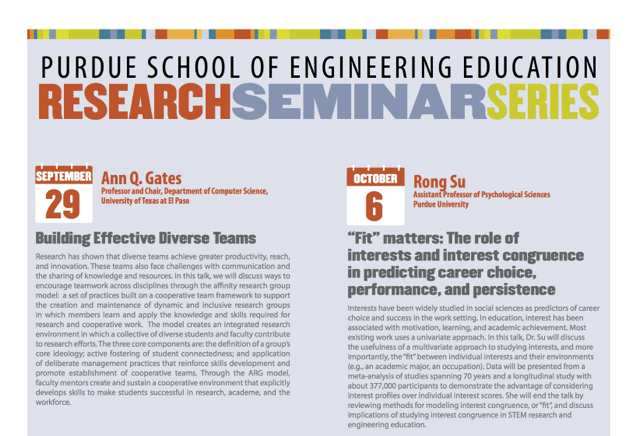News and Events
Events sponsored by the African American Studies and Research Center
Continuing its Talkin’ and Testifyin’ Works in Progress Series, the African American Studies and Research Center welcomes Ms. Gretha Huffington May for her talk entitled, "Afro-Columbians: The People of San Andres, Providence and St. Kathleen Raizal." Join us for this talk on Tuesday, February 7, 2017 3:30 pm STEW 278.
Here are the two sponsored events that took place last week:
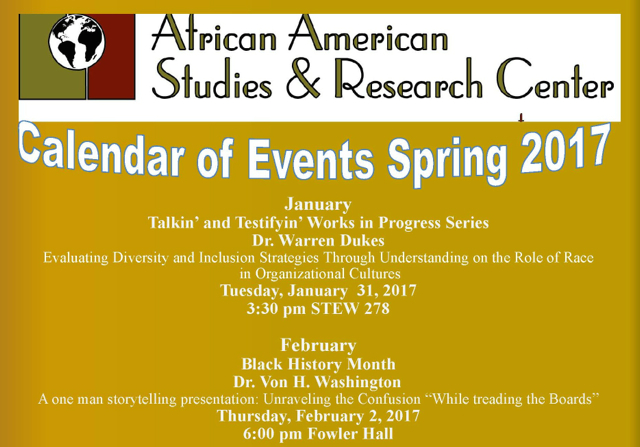
AAC&U Special Issue on Truth, Racial Healing and Transformation
A recent issue of the American Association of Colleges and Universities' (AAC&U's) Liberal Education publication is entitled Truth, Racial Healing & Transformation. It highlights the role of higher education in a "wide-ranging effort to heal racial divides in communities across the country." You can access the Liberal Education issue below.
|
|||||||
  |
|||||||
|
|||||||
  |
|||||||
From Dr. Shaun Harper - views on racial equity and the role of higher educators in addressing race and racism
Diversity expert Shaun Harper, Professor and Founder of the Center for the Study of Race and Equity in Education at the University of Pennsylvania, was recently named Clifford and Betty Allen Professor in Urban Leadership at the University of Southern California's and will lead USC's new Center on Race and Equity.
In a January 9, 2017 interview in the Chronicle of Higher Education Dr. Harper had these things to say about the state of race and racism in the country and on our college campuses, and describes the role that higher educators need to play in the lives of their students regarding educating and debating issues of race. The full interview is found at this link: https://stemedhub.org/groups/stemfacultycop/File:/uploads/Shaun_Harper_-_Racial_Equity__Higher_Ed.pdf
Harper "sees a silver lining for campus race relations" — calling it "the gift of Trump" - because it has exposed the fallacy that the country reached a post-racial state with the election of Barack Obama as President, shows that racism is still pervasive, and points to the collective work that needs to be done.
"If we continue to send millions of college-educated white people into the world without a proper course of study on race and racism, it makes colleges and universities complicit in the perpetuation of racial inequity in the country."
"The role for higher education here is to ensure that students are leaving not just with consciousness but also that they’re leaving with high levels of skill in promoting racial equity."
"One of the signature activities of the USC Race and Equity Center will be (an) inventory of students’ pre-college experiences with diversity. Essentially, colleges and universities across the country will have this tool that they send to students once they’re admitted but before they enroll. The inventory will allow them to get a sense of the racial diversity of their high schools and their neighborhoods — the extent to which they’ve interacted with people of racial and cultural groups that are different from their own.
"(The inventory) will allow institutions to then share the inventory with RAs in their residence halls, with others who work closely with students —their career advisers and so on. So just imagine when a first-year student meets with an academic adviser. That adviser will have more intel about the kinds of experiences that the student may or may not have had and then can recommend to that student, "Here are the kinds of courses you might take that would help fill that gap."
"Colleges and universities should be the marketplace for idea contestation and for debate and disagreement. What we’ve done for decades is we’ve created these spaces where people only talk to themselves — where they only talk to people who are like them. That is not where learning occurs. I would love to see College Democrats and College Republicans and independents come together more often to fiercely debate their ideas — and for it to not just be student-led, but for faculty members and administrators to be right there."
"We as professors cannot be closeted about our political points of view. If you don’t deal with it out loud, it festers underground, and eventually there’s going to be an eruption. So let’s not wait until there’s an eruption. Let’s debate our ideas. There are too few colleges and universities across the country where that happens."
Here is an initiative taking place in higher education that is close to the heart and aspirations of TransformSTEM and our Equity Community of Practice.
- American Talent Initiative - expanding the number of low- and moderate income students in higher ed
On December 13, 2016, thirty of the nation’s most respected colleges and universities announced "a new venture to substantially expand the number of talented low- and moderate-income students at America’s undergraduate institutions with the highest graduation rates." The American Talent Initiative (ATI), coordinated by Ithaka S+R and the Aspen Institute’s College Excellence Program and supported by a grant from Bloomberg Philanthropies, "brings together a diverse set of public and private institutions to ensure that talented young people from every zip code and income level have the opportunity to enroll in institutions with the highest graduation rates and best track records for post-graduate success. By joining ATI, these institutions will focus on enhancing and amplifying their own efforts to attract, enroll, and graduate lower-income students with the idea that, together, they can bring about a scale of national change that no single institution can accomplish alone."
ATI has a national goal to educate "50,000 additional high-achieving, lower-income students at the 270 colleges and universities with the highest graduation rates by 2025." To reach the goal, ATI plans to add more top performing colleges every year to its original 30 founding members.
During 2017, ATI will publish quarterly newsletters describing the research and actions of the initiative. The first paper will focus on "the strategies employed by five institutions that have demonstrated success in raising or reallocating funds to maintain or increase lower-income student enrollment on their campuses."
Recent past events - December 2016
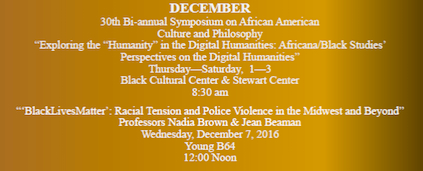 There were two events in December sponsored by Purdue's African American Studies and Research Center and supported by the TransSTEM Center. The African American Studies and Research Center is directed by African American Studies Professor Ronald Stephens, a member of our Community of Practice in Equity and Privilege.
There were two events in December sponsored by Purdue's African American Studies and Research Center and supported by the TransSTEM Center. The African American Studies and Research Center is directed by African American Studies Professor Ronald Stephens, a member of our Community of Practice in Equity and Privilege.
The first was a Symposium on African American Culture and Philosophy, held Thursday to Saturday, December 1-3, in the Black Cultural Center and Stewart Center. The second event, at 12:00 noon on Wednesday, December 7th in Young B64, was a talk by Purdue College of Liberal Arts Professors Nadia Brown (African American Studies and Political Science) and Jean Beaman (Sociology, and also a member of our Community of Practice) entitled, "Black Lives Matter: Racial Tension and Police Violence in the Midwest and Beyond."
"Breaking Through" Proposal Submission
In July of this y ear the Andrew W. Mellon Foundation awarded $750,000 to Purdue University to "support a unique approach to research, scholarly publishing and communications on global grand challenges." Mellon's intent is to have interdisciplinary teams - those from the social sciences, libraries, STEM, and policy - take on "grand challenges in new ways" and get the results "more swiftly and effectively out of the academy into the hands of people who need it." Most of the grant funds will be dedicated to research projects that will run from January 1, 2017 through July 31, 2019, with decisions made to awardees by early December. The title of the project is "Breaking Through: Multidisciplinary Solutions to Global Grand Challenges."
ear the Andrew W. Mellon Foundation awarded $750,000 to Purdue University to "support a unique approach to research, scholarly publishing and communications on global grand challenges." Mellon's intent is to have interdisciplinary teams - those from the social sciences, libraries, STEM, and policy - take on "grand challenges in new ways" and get the results "more swiftly and effectively out of the academy into the hands of people who need it." Most of the grant funds will be dedicated to research projects that will run from January 1, 2017 through July 31, 2019, with decisions made to awardees by early December. The title of the project is "Breaking Through: Multidisciplinary Solutions to Global Grand Challenges."
In early November several members of our STEM Faculty Community of Practice in Equity and Privilege, led by TransSTEM Center Director and CIT Professor Fatma Mili, submitted a proposal for the project, entitled "Breaking Through: Students' Readiness for a Different Future." The highlights of our proposal are as follows:
Problem: Students graduating in 2020 will be the leaders, citizens, and parents of the future. These future leaders will face challenges that are unprecedented and likely to grow exponentially. We organize these challenges into three broad categories.
- The unsustainable depletion and degradation of natural resources
- The strain on socio-economic contracts and institutions
- The search for human identity
Questions: Are we graduating students who have awareness and a sense of urgency about these grand challenges in all of their facets? 2) Are we graduating students who are equipped with multi-disciplinary fluency and the skills to untangle the intricacies of these interdependent challenges? 3) Are we graduating students with the mindset, the heart-set, and the will to collaborate, empathize across divides, and take risks to embrace an uncertain future? 4) As faculty, are we prepared to educate and mentor students for these capacities and attributes?
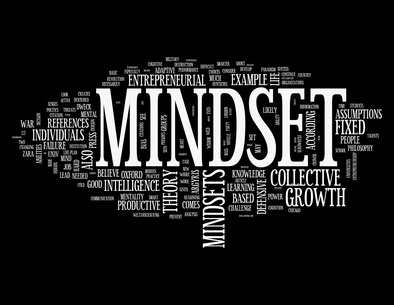
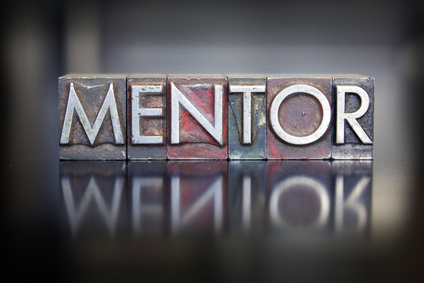
We acknowledge that there is a misalignment between an educational system built on an assumption of continuity and linear evolution on the one hand, and a present and future characterized by disruption and exponential evolution on the other. We will undertake a research-in-action project focused on identifying and addressing the conditions necessary to correct this misalignment.
Action - how we propose to solve the problem:
- Formulate educational human capacities targeted to the changing future;
- Develop a faculty development practice geared towards these capacities;
- Develop a multidisciplinary minor that exemplifies these capacities and offer it at Purdue;
- Develop educational policies for Purdue, Indiana, and professional and accreditation societies that reflect 21st century realities.
Tangible products will include new, more inclusive curricula, an interdisciplinary minor, and a variety of educational policy briefs and recommendations. Professional development will fundamentally change faculty perceptions of their students, teaching practices, and approaches to knowledge acquisition. Developing the process by which we attain this will be an intrinsic intangible outcome. All these outcomes will result in student learning that is more eco-system in nature and equip them to understand and address complex challenges of today and tomorrow.
October 20 (Thursday) - Engineering Education Research Seminar in ARMS B071, 3:30 to 4:20 p.m.
The Purdue Engineering Education's Research Seminar Series continued with a talk on Thursday afternoon, October 20th. The focus of the talk, by Professor Morgan Hynes, was on the importance of appealing to students' personal interests as we seek to increase the number and diversity of students who choose engineering as an academic and career pathway.

October 1-4 NAMEPA 2016 National Conference at Purdue
Purdue University is the site of The National Association of Multicultural Engineering Program Advocates (NAMEPA, Inc.) National Conference, October 1-4, 2016. The theme of the Conference is 100 Shades of Diversity: Broadening Participation. Here is an excerpt of the conference description:
Cultivating diversity in engineering requires a different way of thinking. Join us in a series of engaging conversations to challenge how we think about student success and transform our approach to broaden participation in engineering. Led by NAMEPA’s Partner Institutions and Thought Leaders, the NAMEPA 2016 Conference will present models of curriculum, pedagogy, policies, and programs based in research and proven in practice to bolster the outreach, recruitment, retention, and graduation of underrepresented minorities in engineering.
Four faculty members from our Community of Practice in Equity and Privilege were in attendance, shown in the photo below. From left to right: Ron Stephens - African American Studies and Research Center, Fatma Mili - TransSTEM Center Director, Elena Benedicto - Department of English, and Chris Clifton - Department of Computer Science
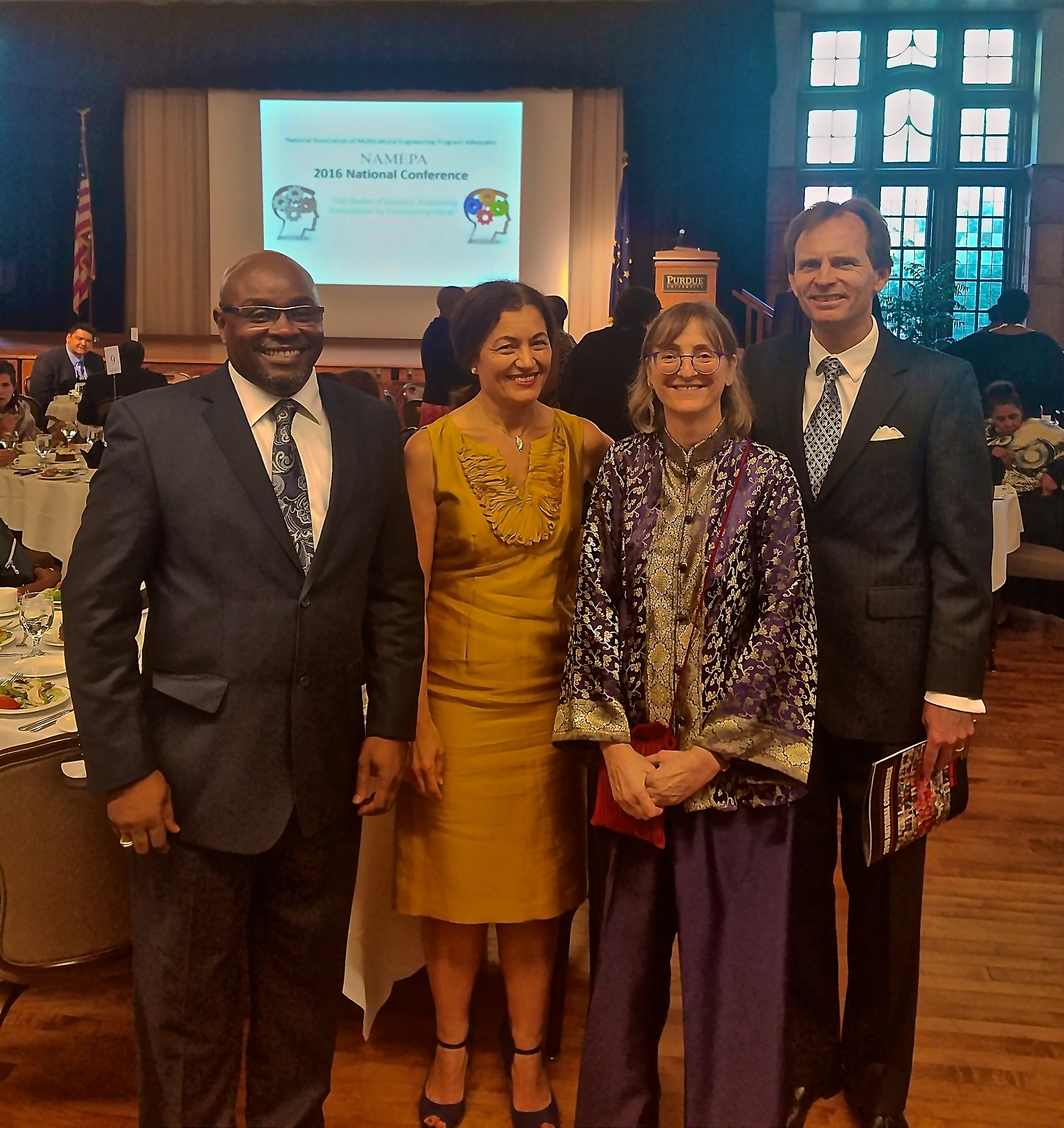
Fall Seminars from the School of Engineering Education
The School of Engineering Education is held four seminars during the Fall 2016 semester. The first was held on September 29th, entitled Building Diverse Teams and led by Ann Gates, and highlighted the ARG ("affiliated research group") model that has had success in drawing together diverse faculty and diverse students to research.
The October 6th seminar by Rong Su centered on "fit" with respect to student interests and career choice. 